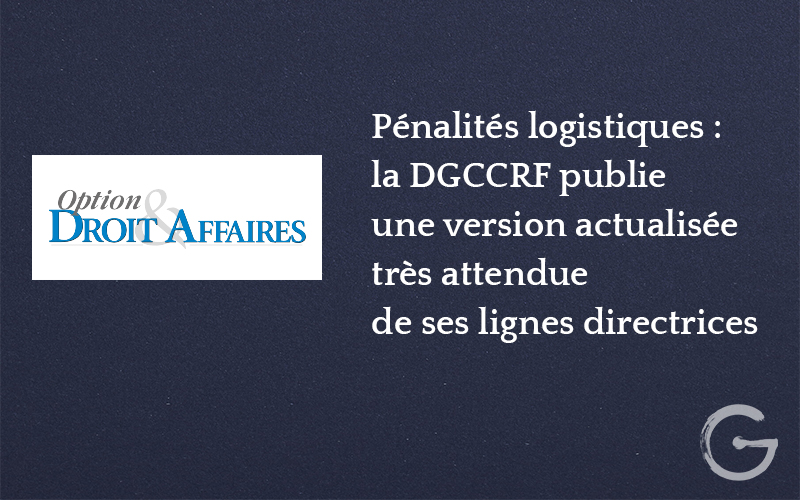Article published in Law & Business option, Wednesday October 18 and reproduced with the kind permission of Sahra Saoudi, editor-in-chief
By Philippe Jouvet, associated.
Logistics penalties: the DGCCRF publishes a much-awaited updated version of its guidelines
On September 21, the DGCCRF published its Frequently Asked Questions relating to the guidelines on logistics penalties which resolve important questions asked by suppliers and distributors from the legislative arsenal developed by the last two laws EGALIM: concept of product category, 2% ceiling, late delivery, annual prescription, automatic deduction, etc.
We remember that the abuses observed during the health crisis had led the legislator (Law “ Egalim 2 » of October 18, 2021) to create a new restrictive competition practice to better regulate practices aimed at penalizing suppliers during late deliveries to distributors.
The Descrozaille law known as “ Egalim 3 » of March 30, 2023 had further considerably expanded the provisions of article L.441-17 of the Commercial Code so that the previous guidelines published by the Administration on July 11, 2022 appeared obsolete.
Hence the wait around these new guidelines which constitute the doctrine of Administration in a matter which directly impacts suppliers' operating accounts and whose internal processing mobilizes a growing number of employees.
The new FAQ first of all usefully clarifies what the term “ logistics penalties » can cover (sanctions, compensation or penalties concerning the non-performance by the supplier of certain of its commitments of a logistical nature) by providing a new illustration: the invoicing by distributor customers for the compliance of pallets, a practice observed in recent months under the term “additional logistics costs” is indeed covered by the provisions of article L.441-17 of the Commercial Code.
Concept of product category and 2% ceiling: the end of a false suspense
Since the adoption of the Descrozaille law, this was the subject most awaited by suppliers who still hoped that the ceiling rule (regarding the maximum amount of logistics penalties invoiced by distributors) of 2% of the value of the products ordered was understood as the value of products missing on delivery.
The DGCCRF rules against them and specifies that it is all products in the product category within which the non-performance of contractual commitments has been noted which is concerned: “ if 200 yogurts out of the 1000 ordered are not delivered, it is the value of the 1000 which will constitute the basis for the 2% ceiling” (and not the value of 200 yogurts if we meant the value of the missing products).
The notion of " catégorie » of products is also explained and is consistent with a certain common sense : sufficiently homogeneous products are grouped into a category: thus within dairy products, yogurt and butter are two different product categories.
Important clarification provided: the 2% ceiling must be calculated for every order of products in the category and not on an annual basis. One way to prevent the ceiling base from flying away with all the products ordered over the year. To take the example above, if a distributor makes 10 orders of 1000 yogurts during the year, it is the value of 1000 which will serve as the basis and not 10. One way for the Administration to rebalance the rules base calculation which were too unfavorable to suppliers.
Automatic deduction: reminder of the conditions of the Civil Code
In accordance with article 1347-1 of the Civil Code, a “ compensation only takes place between two fungible obligations, certain, liquid and payable ». The guidelines here only recall the state of the law which aims to prohibit automatic deductions sometimes practiced by distributor customers and which consist of deducting from the amount of the invoice due to the supplier the sum corresponding to logistical penalties. If the supplier has contested the penalty notice (he has at least one month from sending the notice to do so), then it is not possible for the distributor to offset the debt.
Respect the delivery day: yes but not exactly on time!
« The time is the time; before time, it's not time; after the hour, it's not time ", the expression of Jules Jouy flourished except for the Administration for whom " a delivery delay of a few hours which would result in delivery taking place on the agreed day cannot justify a refusal or return of goods by the distributor ».
It is therefore not the time but the day of delivery that counts.
A temper however provided by the guidelines: it is specified that the delivery which would take place on the scheduled day but “ beyond the closing time of the logistics platform » must be considered equivalent to non-compliance with the delivery day.
One-year limitation period for penalties imposed: it is the invoice and not the notice of penalties that counts
The guidelines look at the semantics of the verb “ inflict ". Concerning the non-performance of a contractual commitment occurring more than a year previously, the date to be taken into consideration for the calculation of the annual limitation period is that of sending the invoice and not that of the notice prior penalty. It is still necessary that the penalty invoice is issued in due form and on the correct date. The Administration found the solution with a system of control by the actors themselves.
Methods for transmitting data relating to logistical penalties to the Administration
This control system provided for by the Descrozaille law (article L.441-19 of the Commercial Code) is explained in the guidelines. The supplier must communicate to the DGCCRF no later than December 31 of each year the amounts of logistics penalties imposed on it (penalty invoices received) by its distributors over the last twelve months as well as those it has actually paid. (penalties paid by the supplier). This data must be detailed month by month and brand by brand. Similarly, the distributor must communicate the amounts actually invoiced and collected so that the Administration can carry out its checks. As a reminder, these communication methods which can be quite cumbersome (even though more simplicity was expected in this area) can result in significant sanctions (500 euros) if they are not respected.
Ultimately, the guidelines provide some important clarifications in the day-to-day management of logistics penalties but the complexity remains. It is the upstream contractualization with the negotiation of logistics contracts which will allow the actors to have more security on the amounts paid (or received) for logistics penalties. As a reminder, these logistics agreements must today be distinct from the obligatory annual agreement which summarizes the result of the commercial negotiation.
The players (distributors and suppliers) must therefore be attentive both to the negotiation of the agreed rate and price and to the clauses of logistics agreements. which must be in compliance with the provisions of article L.441-17 of the Commercial Code, explained by the new version of the guidelines.

Philippe Jouvet
Partner
A lawyer specializing in competition, distribution and consumer law, philippe jouvet is an expert in the agricultural and agri-food sector.
Before joining Ginestié Magellan Paley-Vincent as a partner, Philippe Jouvet was Legal Manager for competition, distribution and consumption within the TEREOS cooperative, where he implemented the system provided for by the EGALIM Law.





